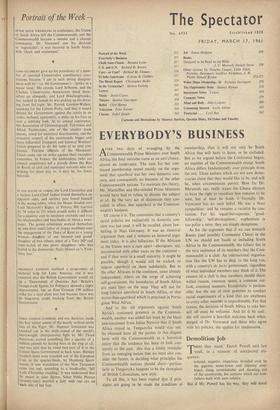EVERYBODY'S BUSINESS
A,,,, two days of wrangling by the Commonwealth Prime Ministers over South Africa, the final outcome came as an anti-climax, almost an irrelevance. The case for her con- tinued membership rested mainly on the argu- ment that apartheid was her own domestic con- cern, and consequently no business of the other Commonwealth nations. To maintain this theory, Mr. Macmillan and like-minded Prime Ministers would have had to refuse to discuss the subject at all. By the very act of discussion they con- ceded, in effect, that apartheid is the Common- wealth's business.
Of course it is. The contention that a country's racial policies are exclusively its domestic con- cern was last used, it will be recalled, about Jew- baiting in Nazi Germany. It was an immoral argument then, and it remains an immoral argu- ment today. It is also fallacious. If the Africans in the Union were a race apart—aborigines, say, unconnected with other races on the continent— and if they were in a small minority, it might be possible, though it would still be wicked, to impose apartheid on them indefinitely. But to the other Africans in the continent, some already independent, others on the verge of achieving self-government, the boundaries of South Africa are mere lines on the map. They will not for long tolerate apartheid in South Africa, or that worse-than-apartheid which is practised in Portu- guese West Africa.
And to the old arguments against South Africa's continued presence in the Common- wealth, another was added last week by the blunt announcement from Julius Nyerere that if South Africa stayed in, Tanganyika would stay out. So obsessed have all the parties to this dispute been with the Commonwealth as a historical entity that the tendency has been to look con- stantly to the past : this was a timely reminder from an emerging nation that we must also con- sider the future, in deciding what principles the Commonwealth nations should share—particu- larly as Tanganyika happens to be the showpiece of British Colonialism, new style.
To all this, it has been replied that if prin- ciples are going to be made the condition of membership, then it will not only be South Africa that will have to leave, or be excluded. But as we argued before the Conference began, no member of the Commonwealth except South Africa differs fundamentally over principle from the rest. Those nations which are not now demo- cracies claim that they would like to be, and will be, when circumstances permit. How far Dr. Nkrumah, say, really wants the Ghana electors to have the right to repudiate him remains to be seen, but at least he holds it formally. Dr. Verwoerd has no such belief. He was a Nazi sympathiser; and he remains a racialist by con- viction. For his `equal-but-separate,' good- fellowship,"self-development,' euphemism is too polite a term; they are simply deceptions.
As for the argument that if we can Stomach Russia (and possibly Communist China) in the UN we should not baulk at including South Africa in the Commonwealth, the fallacy lies in the very insistence of its members that the Com- monwealth is a club. An international organisa- tion like the UN has to deal, in the long run, with a country's de facto government, regardless of what individual members may think of it. The essence of a club is that members should share, within reason, common tastes, a common out- look, common manners. Eccentricity is pardon- able; but the use of club premises to conduct racial experiments of a kind that arc anathema to every other member is unpardonable. For that reason, the decision of South Africa to take her- self off must be welcome. And let it be said: she will receive a heartfelt welcome back when, purged of Dr. Verwoerd and those who agree with his policies, she applies for readmission.






































 Previous page
Previous page